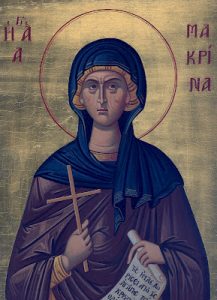 The image of God was truly preserved in you, O Mother, For you took up the Cross and followed Christ. By so doing, you taught us to disregard the flesh, for it passes away, But to care instead for the soul, since it is immortal. Therefore your spirit, O Holy Mother Macrina, rejoices with the Angels! (Trop. 8)
The image of God was truly preserved in you, O Mother, For you took up the Cross and followed Christ. By so doing, you taught us to disregard the flesh, for it passes away, But to care instead for the soul, since it is immortal. Therefore your spirit, O Holy Mother Macrina, rejoices with the Angels! (Trop. 8)
The Byzantine Church commemorates today St. Macrina, recalled as “Our venerable mother, sister of saint Basil, the great.” It has been said that the family is where the seed of sanctity is planted and that saints beget saints. This is true for Macrina and her family: she is a saint among a family of saints. For us, Macrina is a certain guide to a deeper communion with the Most Holy Trinity. Holiness is possible.
Macrina was the older sister of the saints Basil and Gregory. After the early death of her husband, Macrina devoted herself to the education of her younger brothers. It was at this time, also, that she took up the monastic life, and it was due to her influence that her brothers learned the value of the spiritual life and dedication to the service of the Church.
The mother of this remarkable family, St. Emelia, guided a small community of nuns on the family estate in Pontus. Macrina succeeded her mother as the head of the monastery, and in time founded other communities for women.
She spent her last days (she died in 380) with her brother, St. Gregory, the bishop of Nyssa. The funeral oration he said over his sister is a moving testament to the love and esteem not only of a brother, but also one of many who were spiritually enriched by her example. Macrina was buried with her parents.
(NS)
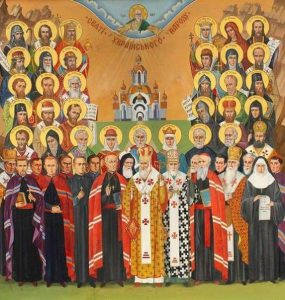
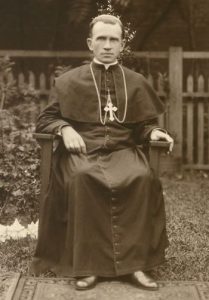
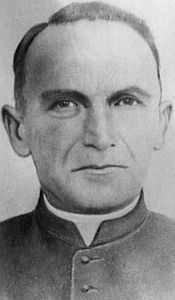 In addition to the Solemnity Annunciation celebrated today, we also have Blessed Emilian Kovch (1884-1944), a married Eastern Catholic priest and father of six who was persecuted under Communism and Nazism. Father Kovch died on March 25, 1944. He was beatified by St. John Paul II on 27 June 2001.
In addition to the Solemnity Annunciation celebrated today, we also have Blessed Emilian Kovch (1884-1944), a married Eastern Catholic priest and father of six who was persecuted under Communism and Nazism. Father Kovch died on March 25, 1944. He was beatified by St. John Paul II on 27 June 2001.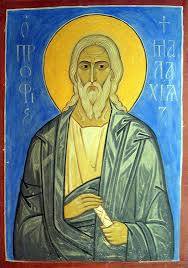 The Byzantine Church keeps the liturgical memorials of the Old Testament prophets, even though the Latin Church has their names on Roman Martyrology, and perhaps on a different day. May the Holy Prophet Malachi intercede for us.
The Byzantine Church keeps the liturgical memorials of the Old Testament prophets, even though the Latin Church has their names on Roman Martyrology, and perhaps on a different day. May the Holy Prophet Malachi intercede for us.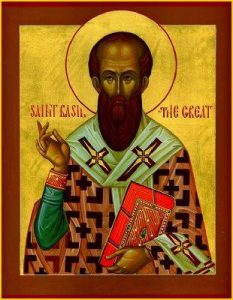 St. Basil fell asleep in the Lord on January 1, 379, and the young age of 49. He is truly called “Great” for in his short life the light of Christ shone through him, revealing how a Christian should live – in faith, for he opposed the Arian heresy, and proclaimed the divinity of our Lord, in hope, for he established monasteries looking toward God in spirit, confessing Christ t
St. Basil fell asleep in the Lord on January 1, 379, and the young age of 49. He is truly called “Great” for in his short life the light of Christ shone through him, revealing how a Christian should live – in faith, for he opposed the Arian heresy, and proclaimed the divinity of our Lord, in hope, for he established monasteries looking toward God in spirit, confessing Christ t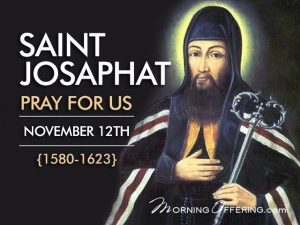 St. Josaphat (1580-1623) was born to a devout religious family of Ruthenian ancestry in what is now Ukraine, and was baptized in the Eastern Orthodox Church. He devoted his virginity to the Virgin Mary and grew in his reverence for ancient liturgy. During a revival of Eastern Catholic monastic life he became a monk in the Order of St. Basil, and was ordained to Holy Orders in the Uk
St. Josaphat (1580-1623) was born to a devout religious family of Ruthenian ancestry in what is now Ukraine, and was baptized in the Eastern Orthodox Church. He devoted his virginity to the Virgin Mary and grew in his reverence for ancient liturgy. During a revival of Eastern Catholic monastic life he became a monk in the Order of St. Basil, and was ordained to Holy Orders in the Uk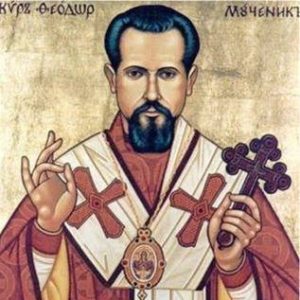 In the Byzantine Catholic Church keeps the feast of Blessed Theodore Romzha is celebrated today. He was a martyred bishop of Mukachevo in Transcarpathia who was killed by the Soviets in hatred for the faith.
In the Byzantine Catholic Church keeps the feast of Blessed Theodore Romzha is celebrated today. He was a martyred bishop of Mukachevo in Transcarpathia who was killed by the Soviets in hatred for the faith.